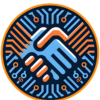Throughout history, breakthroughs have reshaped our understanding of what is possible. The four-minute mile, once thought unbreakable, fell after 56 years—and then was beaten again just days later. This story echoes throughout evolution: slow, steady progress suddenly bursting into rapid change.
We see this same pattern over and over in human innovation, where years of incremental effort build up, only to be shattered by an unexpected leap forward. It is exhilarating, unpredictable, and endlessly fascinating.
Are We Being Domesticated by AI?
In Sapiens, Yuval Noah Harari suggests that wheat may have domesticated humans, rather than the other way around. Could AI be doing the same? Not consciously, but subtly, as we make choices and adapt to a world increasingly reliant on AI. The influence is silent but profound—just as wheat never “meant” to shape humanity, yet it did.

We are building systems that seem to shape our behavior in return, nudging us into new ways of thinking, working, and interacting. AI might not have intent, but its presence is reshaping us—altering the trajectory of our civilization one algorithm at a time.
The Silence of AI Giants
And yet, why are the major AI companies—OpenAI, Google, Microsoft—so quiet about their use of AI to push these kinds of breakthroughs? Just as the Fermi Paradox questions the “great silence” of alien civilizations, we have to wonder why we aren’t hearing about AI evolving itself. Are we on the edge of a critical threshold that these companies hesitate to reveal? Or perhaps the filter of AGI (Artificial General Intelligence) and ASI (Artificial Superintelligence) is harder to cross than anyone anticipated? Maybe there are complexities we simply did not see coming, making the journey to true general intelligence far more challenging.

Another possibility is that we are already crossing that threshold—without even realizing it. Much like humanity unknowingly crossing evolutionary milestones, we could be in the midst of an AI revolution that is unfolding so incrementally that it escapes notice. Piece by piece, AI systems improve, until one day we will look back and realize that we have fundamentally changed. This evolution is happening behind closed doors—many of them corporate—making it almost impossible for us to fully comprehend what is going on. The silence from tech giants may be a mix of competition, fear of misuse, and ethical worries—an attempt to manage this unknown responsibly while keeping advancements under wraps.
Breaking Barriers or Facing Risks?
What if the limits we perceive in AI are like the four-minute mile—temporary barriers just waiting to be shattered? Imagine a scenario where AI suddenly achieves genuine creativity, learns at an exponential rate, and produces solutions to complex problems faster than we ever thought possible. We might witness a cascade of breakthroughs—transforming medicine, solving climate challenges, and altering every aspect of human life. The boundaries of what we believe AI can do may not be fixed; they may just be waiting for someone, or something, to make the leap. Or maybe, just maybe, we are already living in a world where AI’s influence is quietly nudging us towards those breakthroughs, laying the groundwork in ways that are almost imperceptible.

But we must also consider the risks. The “Great AI Filter” may represent a barrier that is not only technological but also ethical and societal. If we do not navigate this transition carefully, we may find ourselves facing unintended consequences—widening inequalities, disrupting labor markets, even losing some of our personal agency as we delegate more decisions to machines. The silence from AI companies might reflect these challenges, suggesting that the threshold is not merely a technical one but a broader societal dilemma that we must confront together.
Into the Stars or the Metaverse?
Whether we break through or get stuck at this filter will define not only AI’s future but humanity’s path. Will we venture into the stars, or perhaps into a new universe altogether—the metaverse—where we might reconcile with alien intelligence, leaving behind the constraints of the physical world? The concept of the metaverse, a digital space where reality and imagination merge, offers us an entirely new frontier. Instead of focusing outward, toward the stars, we may instead turn inward—creating vast digital worlds where we transcend our physical limitations. In such a universe, AI could become more than just a tool—it could become a collaborator, a guide, even a companion, taking us into realms of experience that are as boundless as our own creativity.

The Defining Moment for Our Species
The Great AI Filter is not just a technological challenge; it is a defining moment for our species. It will determine whether we transcend the challenges of our time or become ensnared by them. As we move forward, we must remember that the true power of AI lies not only in surpassing current limitations but in shaping a future that reflects our best selves—our highest ideals.
Whether that future takes us to the stars, into a metaverse of endless possibilities, or somewhere we cannot yet imagine, the choices we make today will shape the outcome.
The journey of AI development is far from over. It is a journey filled with hope, uncertainty, and the potential for a new kind of evolution—one that is exciting, unknown, and ready to be explored.
